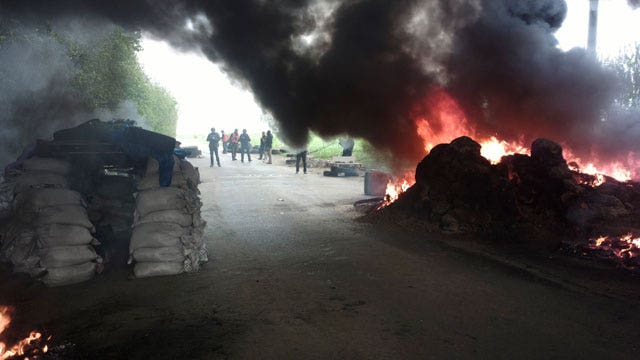Putin creating 'pretext' for Russian involvement in Ukraine?
Deadly fighting escalates between troops and pro-Russians
Information is power, which explains why Russian President Vladimir Putin wants to keep the media under his control. One can only assume that the announcement of the impending closure of Radio Free Europe/Radio Liberty’s Balkans Service is music to Putin’s ears.
For the past 65 years, Radio Free Europe has broadcast independent news programming behind the Iron Curtain and beyond, with reports now spanning 28 languages and 21 countries. The service was an especially valuable asset during the years of Soviet power, and it remains increasingly critical in the wake of Putin’s expansionism today.
It is alarming, therefore, that the Broadcasting Board of Governors (BBG) has decided to prioritize initiatives in Africa and Asia in its FY2015 budget at the expense of news services to Eastern Europe and Iraq. Surely the BBG – which recently condemned the Kremlin’s decision to end all radio broadcasting by U.S. international media in Russia – recognizes the signal that these closures send to strongmen like Putin, who seek to limit free speech.
[pullquote]
The BBG’s $721 million budget request – a decrease of $12 million from last year – cuts the programming of Radio Free Europe/Radio Liberty carried by more than 150 affiliate stations across Bosnia, Serbia, Montenegro, Macedonia, and Kosovo. The loss of these independent media voices could have far-reaching implications, undoing the progress that has been made and jeopardizing the general welfare of millions living within Putin’s reach.
The Kremlin was swift to control the press during its illegal invasion of Ukraine’s Crimean peninsula.
Armed men presumed to be Russian troops quickly seized communications hubs.
Journalists have been targeted at border checkpoints and had their equipment confiscated.
Ukrainian TV stations and local broadcasts have been replaced with Orwellian Newspeak as Russia pumps tens of millions of dollars into the media market there.
It stands to reason that Putin relishes the opportunity to expand Russia’s influence in Southeast Europe as independent news coverage from Radio Free Europe and Radio Liberty recedes.
Russia’s intentions in Ukraine have rightly reinvigorated the debate about what fights America is willing to have beyond its shores.
Putin’s actions defy international law and have violated the sovereignty of an independent nation, inflicting social and economic instability in the region and raising concern around the globe.
Tough sanctions are warranted, as well as Russia’s isolation on the international stage.
However, the strength of U.S. power should not be limited to force projection or economic pressure. The encouragement of values like freedom of speech and expression can have a resounding and far-reaching impact, challenging the propaganda of totalitarian regimes with democratic ideas spurred by genuine civic participation.
History underscores the importance of Radio Free Europe in delivering a message of liberty and democracy. During the Cold War, radio waves carried the words of President Reagan and Pope John Paul II to people in countries overshadowed by Communist rule.
In 1989, after political revolutions swept Central and Eastern Europe, Czech President Vaclav Havel wisely observed: “Words can prove mightier than ten military divisions.”
It is our hope that the BBG will reverse the decision to end news programming to the Balkans and Iraq. Cutting important communication to areas of the world where America’s interests are threatened weakens our position and that of our democratic allies. Any action to close these broadcast services should not take effect until the proper congressional oversight can adequately assess the consequences.
The information war reaches far beyond the borders of Crimea. At the very least, the United States must aggressively engage in the battle of international ideas.
Putin has been emboldened by the success of his latest aggressions, using rhetoric that suggests the restoration of the Russian empire. America should not forfeit the opportunity to reinforce free speech in a media landscape at risk of even more repression.

